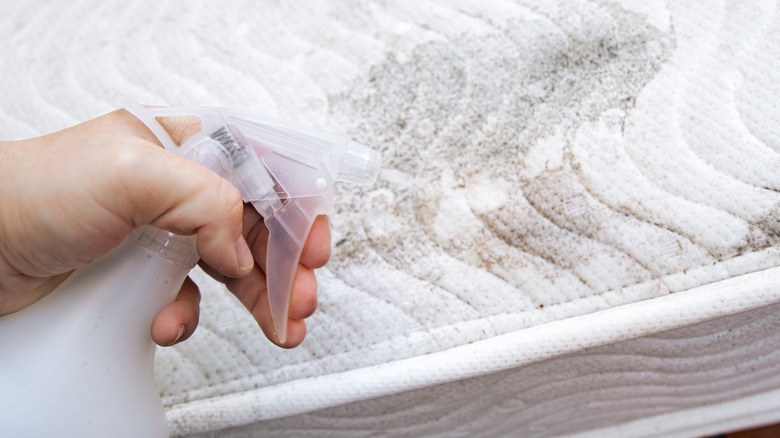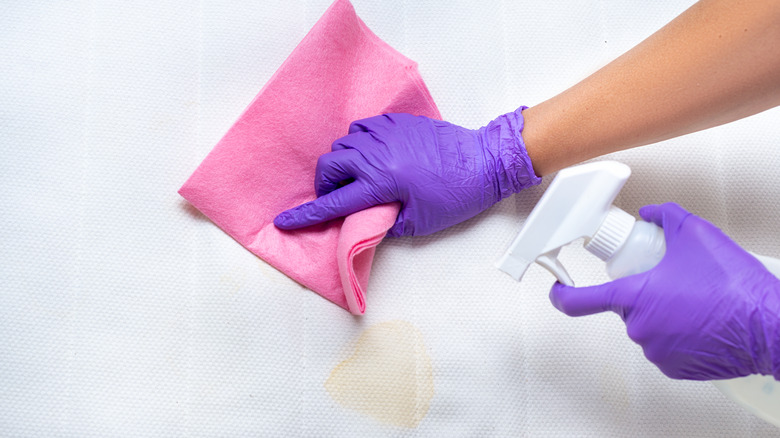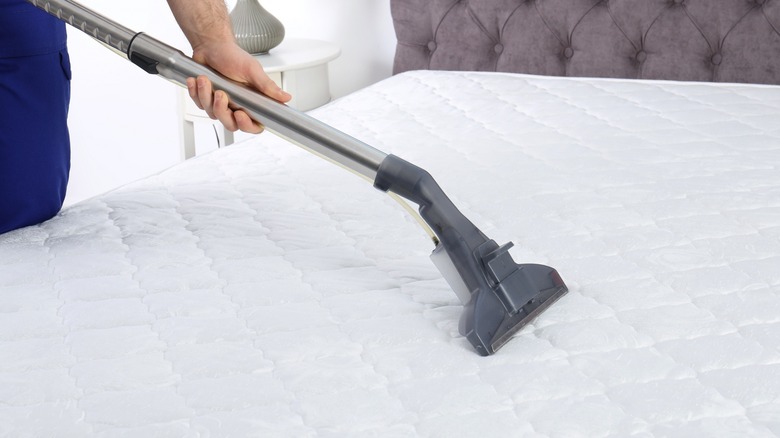The Cleaning Agent You Should Avoid Using On Your Mattress At All Costs
Let's face it: over time, your mattress can get pretty gross. Because you sleep on it every night, it's eventually going to accumulate dust, odors, and a few stains. It's a good idea to clean your mattress once in a while, but folks are frequently reaching for a cleaning agent that's actually a big no-no: bleach. Yes, it's tempting to use bleach to get rid of a stain or just to make your old bed "feel clean," but bleach should never be used for this purpose. The primary reason for this is that bleach is a toxic substance, so inhaling the fumes or making direct skin contact with this cleaner can have serious effects on your health. Mattresses are made out of absorbent materials, and your entire body touches it for prolonged periods of time. If you wouldn't want to spend eight hours lying on a giant bleach-soaked sponge, don't put any of this cleaning product on your mattress.
Aside from basic health concerns, bleach can also have a detrimental impact on the appearance and long-term durability of your bed. In reality, there are cleaning methods that work much better and don't rely on harsh chemicals. If you switch to simpler, nontoxic cleaning agents for your mattress, you'll be ensuring that your sleeping area is getting effectively cleaned without damaging your bed or creating an unhealthy environment.
Why you should never use bleach on a mattress
You should never use bleach to clean your mattress because it's toxic to the human body and can cause damage. The health risks of bleach mostly come down to the fact that it contains chlorine, and the Centers for Disease Control and Prevention (CDC) warns that chlorine can cause irritation and damage to the eyes, throat, and lungs. Even if you wear a mask while applying the bleach, later on you'll still be breathing in the lingering chemicals that were absorbed into the mattress. Aside from respiratory problems, bleach can also cause skin irritation, allergic reactions, and chemical burns in extreme cases. No one wants to wake up from a long night's sleep with rashes or skin injuries.
Moreover, because bleach is so corrosive, it's actually too harsh to use on the delicate fibers of a mattress. Applying bleach to your bed can ultimately weaken fibers and degrade the material. Weaker fabric means a bigger risk of holes and tears — in the end, this can shorten your beds' lifespan. On a more superficial level, bleach turns things pure white. Most mattresses aren't this color, especially after a few years of use, so if you use bleach on one section, you're going to get a funky patch of discoloration. It's also worth noting that bleach isn't effective for addressing some of the primary hygiene concerns of a mattress such as dust mites and other allergens.
Alternatives to bleach for mattress cleaning
Before you start applying a bunch of cleaning agents to your mattress, the first step should be vacuuming. Using the upholstery attachment, vacuum up a lot of the dust, hair, and dirt on the surface of the mattress. If you're dealing with odors or moisture, follow up the vacuum job with some baking soda. Sprinkle a generous amount over the gross area and wait at least 15 minutes (or longer if you're dealing with a bigger mess) for it to absorb any excess moisture or smelly particles. Then, vacuum up the baking soda to leave your mattress clean and fresh.
If you really feel that your mattress requires a true cleaning agent, there are products that are far less aggressive than bleach. Plain old soap and water always goes a long way, but for something with a disinfectant power comparable to bleach, use water and hydrogen peroxide to get rid of stains. Hydrogen peroxide is less toxic than bleach but will still kill the bacteria — just be sure that your mattress is fully dry before you remake the bed. For serious stains from bodily fluids like sweat or urine, you may want to try an enzyme cleaner, which breaks down germs without using toxic chemicals. While bleach often seems like the ultimate cleaning agent, you're much better off using gentle, body-safe materials instead.


